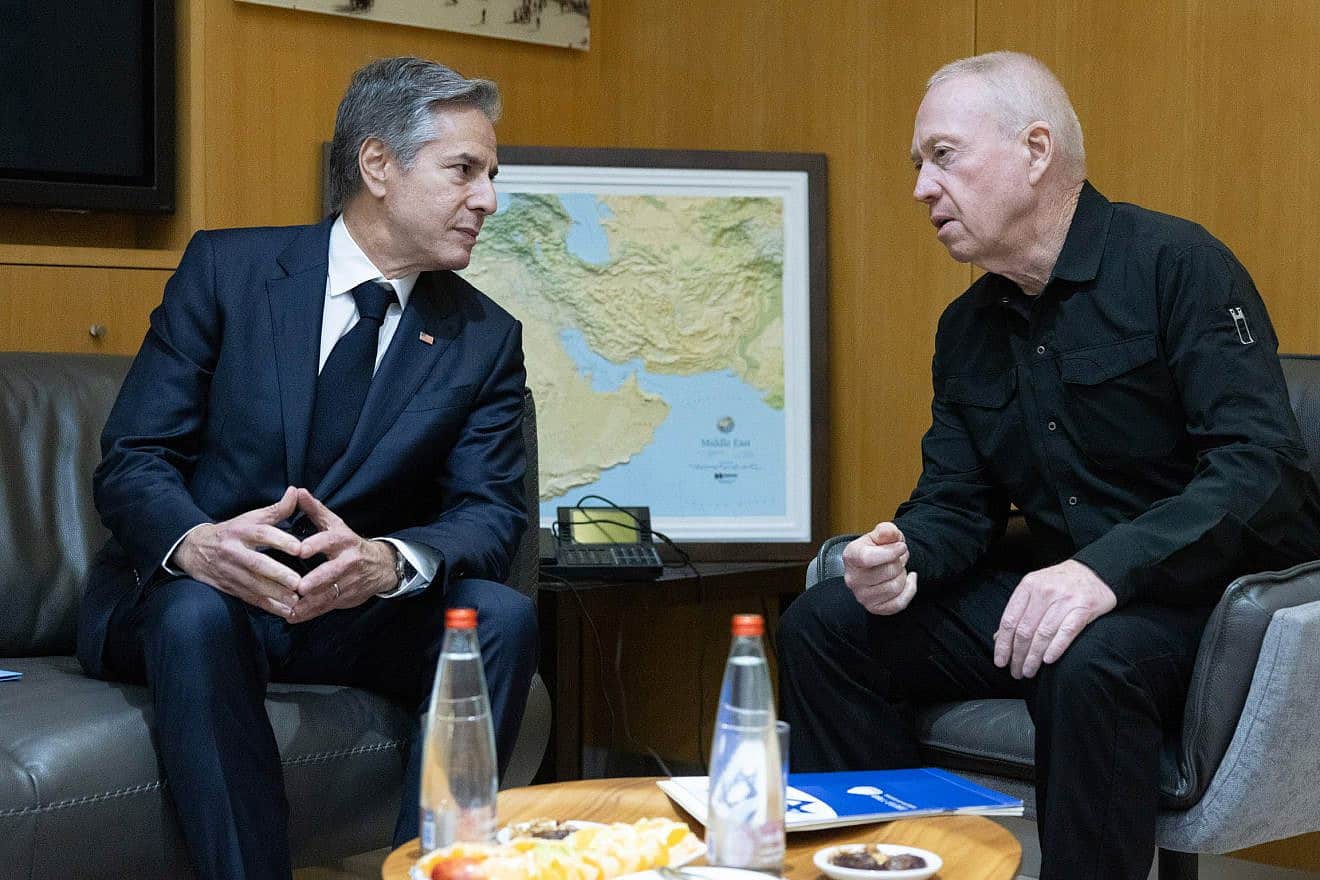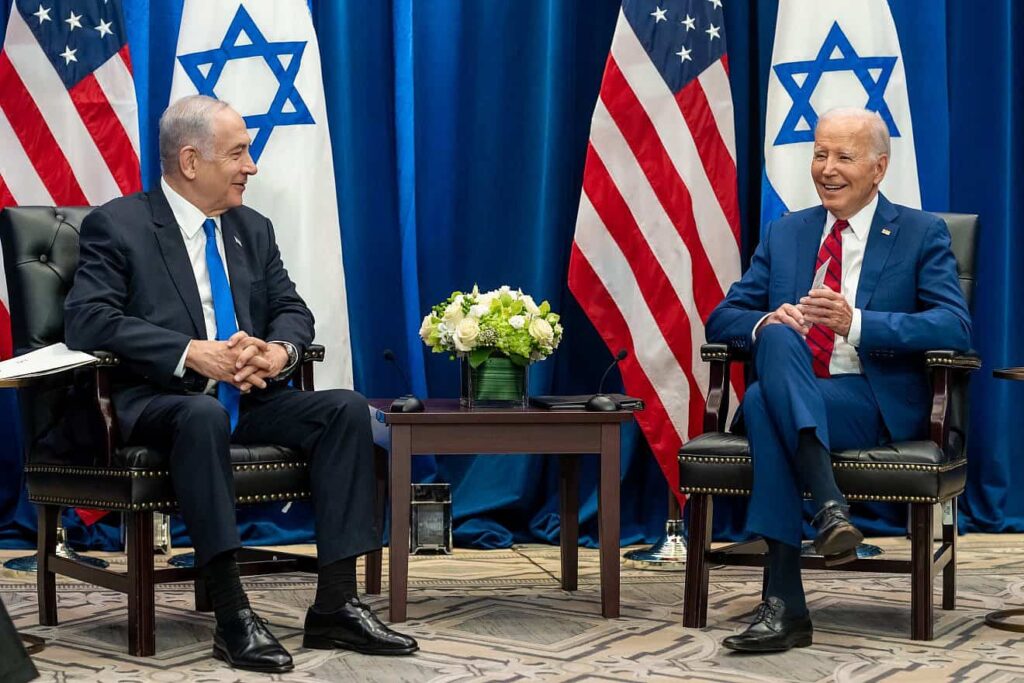
Biden’s Middle East diplomacy is about Michigan
Secretary of State Blinken’s push to revive Israel-Saudi normalization by promoting a Palestinian state that will never happen is motivated by election- year politics.
U.S. Secretary of State Antony Blinken is back in the Middle East for yet another round of meetings. The point of it is, as with his previous trips since Hamas launched a war against Israel on Oct. 7, is to work for a “diplomatic solution” to the region’s problems. To that end, he is promoting a plan that would theoretically have something for everybody.
According to the latest story based on Biden administration spin planted in The New York Times, if Israel will only listen to its advice and warnings, the war will soon end, progress towards peace with the Palestinians will be made and Saudi Arabia—the missing crown jewel of the next stage of the Abraham Accords—will finally normalize relations with the Jewish state, thus achieving Prime Minister Benjamin Netanyahu’s chief foreign-policy goal.
The first thing to understand about the American proposals is that they are a combination of short-term ideas that would materially harm Israel’s security with long-term ideas that are pure science fiction.
Even more important than that, they are primarily about President Joe Biden’s hopes for re-election, not peace in the Middle East.
Calling Blinken’s ideas a “plan” is probably giving them more credit than they deserve. But for the sake of argument, let’s consider them as a whole as if they were a coherent strategy rather than a loose collection of disjointed talking points.

Blinken’s fantasy proposals
They involve a ceasefire in the Gaza Strip, the return of Palestinians to the northern part of the coastal enclave and ensuring that almost none are to be resettled elsewhere. This would allow the Palestinian Authority to take some responsibility for the governance of Gaza and the restarting of long-moribund negotiations that would create a sovereign independent Palestinian state there, as well as in Judea, Samaria and Jerusalem. And then at the end of the rainbow, Israel would be rewarded with full normalization of relations with Saudi Arabia.
The only problem is that while a ceasefire is a realistic prospect—provided Israel can be compelled to agree to it—the rest of it is pure fantasy.
It’s theoretically possible that some sort of deal could be crafted between Israel, Hamas and the P.A. with the help of the Americans and Qatar. Such an agreement would likely call for the release of the remaining Israeli hostages and possibly include some symbolic gesture—like the exile of Hamas’s remaining top leaders in Gaza—to make it appear as if Israel is getting something out of all the blood and treasure it expended after the atrocities of Oct. 7 to ensure that it could never happen again. The Islamist terrorists would almost certainly return to the parts of Gaza from which Israel has already evicted them. Thus, it would amount to a rough restoration of the pre-Oct. 7 status quo in which a battered but operational Hamas still controlled Gaza. That would be true even if it also involved some window dressing that would allow members of P.A. chief Mahmoud Abbas’s Fatah Party to return to Gaza and to claim to have some role there.
At that point, diplomacy, whose goal would be to create a formal Palestinian state and the putative end of the century-long conflict, could resume. And once those talks succeed—though every previous attempt has failed—the Saudis would exchange ambassadors with Israel, and all would be well.

Provided that Netanyahu’s unity government is weak and foolish enough to be persuaded to end the war before Hamas is completely defeated, as well as desperate to end the pressure to ransom the hostages, those aspects of the scheme could be achieved.
Gaza would revert to full Palestinian control. Despite the heavy losses incurred by Hamas during the fighting and regardless of whether such a postwar deal would be treated as if Abbas had extended his rule to Gaza, this would strengthen the Islamist group immeasurably. Rather than ending the threat from Hamas, Fatah’s grip on any of the territories would be weakened. Palestinians were ready to say that the Oct. 7 pogroms were a great idea, even when they involved suffering for the people of Gaza. But if the war ends without Hamas being completely eliminated and with substantial numbers of terrorists released in exchange for the hostages, it would not unreasonably be represented as a victory for those who committed the largest mass slaughter of Jews since the Holocaust.
But no one should be under any illusion that talks aimed at creating a Palestinian state would succeed, even though that, too, would be a reward to Hamas and its supporters for committing murder, rape, torture and kidnapping on Oct. 7. The Palestinians have demonstrated time and again over the last 30 years since the Oslo Accords that they have no interest in any solution to the conflict that involves their recognition of the legitimacy and permanence of a Jewish state, no matter where its borders are drawn, even if it means they get an independent state.
That doesn’t even take into consideration that regardless of their opinions about Netanyahu, support among Israelis for a Palestinian state that would make more Oct. 7 horrors possible, if not likely, doesn’t exist anymore.

Biden’s protestations to the contrary, Palestinian cheers for the crimes of Oct. 7 demonstrated that Hamas’s stated goals of destroying Israel and genocide of the Jews remain popular among Palestinian Arabs. The chances that they will be more amenable to a two-state solution in the future will be even smaller if they manage, with the help of the Biden administration and the international community, to prevent Israel from destroying Hamas.
Wishful thinking about the Saudis
That brings us to the Saudi part of the puzzle.
The Saudis’ strong under-the-table ties they’ve maintained with Israel, coupled with their acquiescence to the decision of the United Arab Emirates and Bahrain to normalize relations with Israel under former President Donald Trump’s Abraham Accords, has led many friends of Israel to believe that it was only a matter of time before they, too, concluded a formal peace with the Jewish state. That has also been one of Netanyahu’s chief objectives.
Many observers have assumed that one of the chief reasons for Hamas’s Oct. 7 attacks was to derail an imminent Israel-Saudi peace. The same people seem to think that once the war is over, it again becomes a possibility. The Saudis themselves have encouraged that belief with public statements declaring their willingness to consider such a move, provided that it comes after the Israelis have made gestures towards or already created a Palestinian state.
While this belief fits in with preconceptions about the Arab world’s acceptance of Israel in the aftermath of the Abraham Accords, it’s time to consider whether this is wishful thinking.
The Saudis could have normalized relations with Israel at any time in the last three years but chose not to do so. The obvious reason was that they remain perfectly satisfied with their current relationship with Jerusalem. The status quo provides them with a tacit military ally without incurring any of the political costs that would involve the regime—whose legitimacy rests on it being the guardian of the Islamic holy places in Mecca and Medina—formally recognizing Jewish sovereignty in a part of the world that Muslims regard as their sole preserve.
Since former President Barack Obama’s 2015 Iran nuclear deal, the Saudis have needed Israel to be their ally against their foes in Tehran. That remains the case. But their hold on power also rests on not risking it by being depicted as an ally of the Jews.
The Saudis’ lack of seriousness about normalization was made obvious when they responded to the Biden administration’s belated effort to expand the Abraham Accords last year with an unrealistic list of demands to Washington. They knew that neither Biden nor Trump nor any conceivable American president would agree to help them acquire nuclear capability. And a formal U.S.-Saudi security alliance was never in the cards either, especially not as long as the Democratic Party, which is deeply hostile to the Saudis, was in power.
Nor do the Saudis mean what they say about wanting a Palestinian state. They make such statements so as to stay in sync with public opinion in the Arab world and thereby avoid giving ammunition to those who would like to see the Saudi royal family deposed. In private, they have no desire to help create what would be, at best, another weak, unstable Arab state vulnerable to being taken over by Islamist forces hostile to the Saudi government. Their support for the Abraham Accords showed that they didn’t wish to be held hostage to Palestinian intransigence. But it doesn’t necessarily follow that they have a compelling desire to join themselves.

Biden’s political problems
Looked at soberly, Blinken’s talking points about Palestinian statehood and Saudi normalization are not serious proposals. But they do serve a very serious purpose for the Biden administration: helping the president get re-elected.
The war on Hamas has been a major political problem for Biden. He has correctly expressed support for Israel’s right to defend itself and for the goal of eliminating Hamas. But with the base of his party under the sway of woke intersectional lies about Israel being a “white” oppressor of people of color, his campaign is reeling from dissent within the ranks of Democratic staffers and the party’s left-wing activist base. This created a civil war within the party with letters demanding that he abandon Israel and impose a ceasefire that would allow Hamas to survive coming from lower-level appointees throughout the government, in addition to Democratic congressional staffers. The latest broadside came from within his own re-election campaign staff, which not only repeated Hamas propaganda but accused him of complicity in alleged Israeli atrocities. It also stated plainly that it was support for Israel that was costing him the support of young voters.
Polls have shown that young Democratic voters, who like the mobs of students on college campuses chanting for Israel’s destruction and Jewish genocide have likely been indoctrinated in critical race theory and the diversity, equity and inclusion catechism, oppose Biden because of his refusal to abandon Israel. That’s in spite of the fact that the administration has been second-guessing and undermining Israel throughout the war. As Blinken made clear again this week, Washington wants a war against Hamas in which no Palestinian civilian human shields are hurt—a goal that is even more of a fantasy than the scenarios about Palestinian statehood and formal Israeli-Saudi peace. But that hasn’t satisfied the administration’s noisy left-wing critics.
Should Biden listen to the pleas of his base and betray Israel, it would cost him the votes of centrist and independent voters who still back the Jewish state against its foes. But if he doesn’t listen to them, it will sap the Democratic base of enthusiasm and depress voter turnout—factors that would likely cost him the election. On top of that, Muslim and Arab-American voters who turned out for Biden to defeat the openly pro-Israel Trump in 2020 would also presumably stay home or vote for third-party candidates in November.

That is illustrated by the latest polls in Michigan, with its large Arab-American population, which show Trump defeating Biden decisively in that state. The margin only increases when third-party candidates are included.
So, while Blinken’s proposals are unrealistic, they make perfect sense from the point of view of Biden’s campaign. The president needs a quick end to the war and gestures that favor the Palestinians if he’s going to reassemble his 2020 coalition and win Michigan this fall. And unless the Democrats’ left-wing base is re-energized by policies that allow the president to distance himself from Israel, the same is true for the country as a whole.
Israel remains dependent on Biden’s goodwill to maintain the flow of arms that the Israel Defense Forces need to keep fighting until victory against Hamas. And Netanyahu is politically weak and also under pressure to find a way to ransom or rescue the hostages. But no one should be under any apprehension that administration policy proposals will bring peace, make Israel more secure, or help defeat Hamas and ensure that this genocidal terrorist group can’t make good on its pledge to commit more Oct. 7 slaughters in the future.
Everything Blinken is saying about the Middle East right now is really about Michigan, not peace for Israel, the Saudis or the Palestinians.
Jonathan S. Tobin is editor-in-chief of JNS (Jewish News Syndicate). Follow him: @jonathans_tobin.
The post Biden’s Middle East diplomacy is about Michigan appeared first on Israel365 News.
Israel in the News